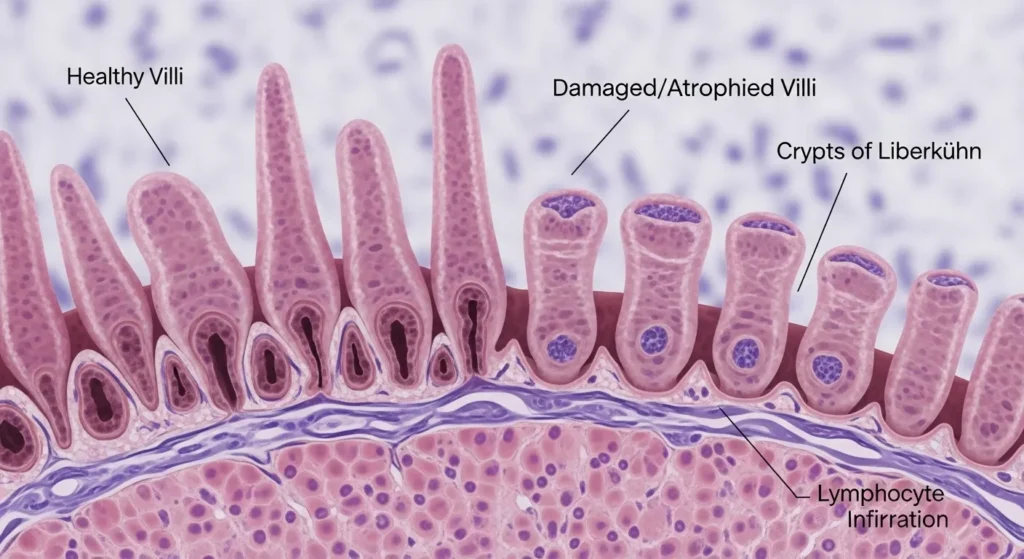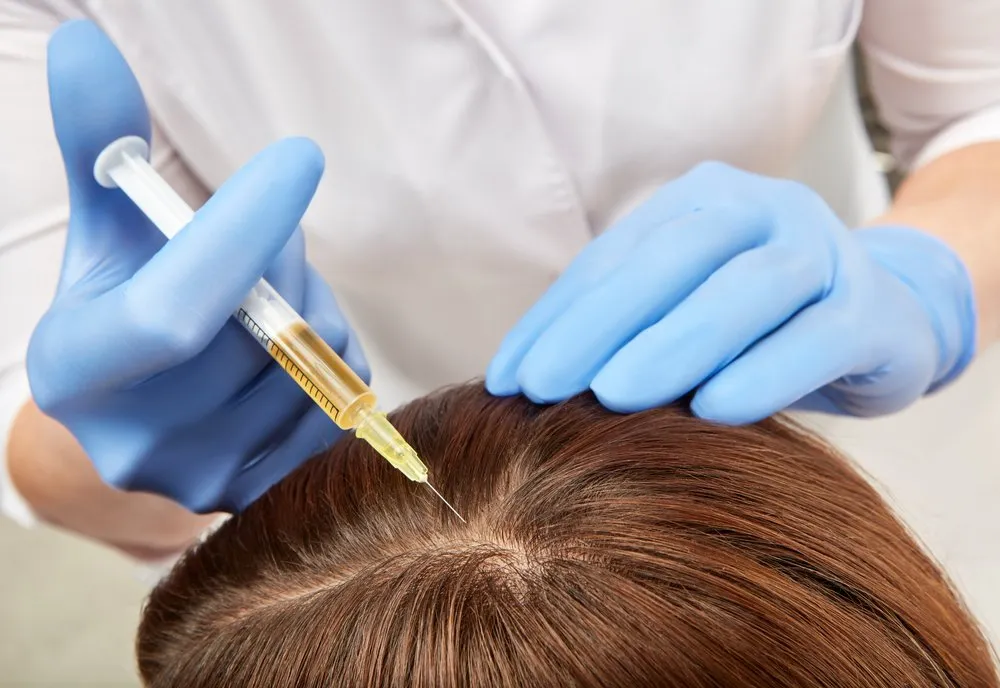Are you experiencing unexpected hair loss and wondering if your gut health could be to blame? Coeliac disease and hair loss are more closely linked than many people realize. This autoimmune disorder can lead to nutrient deficiencies, inflammation, and scalp-related issues—all of which contribute to hair thinning or shedding.
In this article, you’ll learn how coeliac disease affects hair health, which symptoms to watch out for, and how to treat hair loss effectively. Backed by medical insights, this guide will help you regain both your confidence and your hair.
What Is Coeliac Disease?

Definition and Autoimmune Nature
Coeliac disease is a chronic autoimmune disorder in which the body reacts abnormally to gluten, a protein found in wheat, barley, and rye. When people with coeliac disease consume gluten, their immune system attacks the small intestine, leading to inflammation and damage.
Common Symptoms Beyond Digestion
While digestive issues like bloating, diarrhea, and gas are common, coeliac disease can present with non-GI symptoms as well. These include:
- Fatigue
- Anemia
- Mood disturbances
- Skin conditions
- Hair loss
How Gluten Affects the Body
The damage to the small intestine impairs nutrient absorption. Over time, this can lead to widespread deficiencies in iron, zinc, biotin, and other essential nutrients, many of which are crucial for healthy hair growth.
Can Coeliac Disease Cause Hair Loss?
Yes, coeliac disease can cause significant hair loss, often as a result of nutrient malabsorption and immune-related responses.
The Link Between Nutritional Deficiencies and Hair Health
Hair follicles are sensitive to changes in your body’s nutritional balance. Deficiencies in iron, B vitamins, and protein can trigger telogen effluvium, a condition where hair prematurely enters the shedding phase.
How Gut Damage Leads to Hair Loss
In coeliac disease, the villi—tiny projections lining the small intestine—are damaged. This reduces your body’s ability to absorb nutrients vital for hair growth, such as:
- Iron (crucial for oxygen transport to hair follicles)
- Zinc (important for tissue growth and repair)
- Biotin (supports keratin infrastructure)
- Vitamin D (regulates immune function)
Telogen Effluvium and Autoimmune Triggers
Hair loss in coeliac patients is often telogen effluvium, a reversible form of shedding caused by stress or shock to the system. Autoimmune activity in coeliac disease can also lead to alopecia areata, a condition where the immune system attacks hair follicles directly.
Signs of Hair Loss Related to Coeliac Disease
Recognizing the signs early can lead to better outcomes.
Diffuse Thinning vs Patchy Hair Loss
- Diffuse thinning: Hair appears evenly thinner across the scalp.
- Patchy loss: May indicate an autoimmune condition like alopecia areata.
Sudden Shedding (Telogen Effluvium)
Often occurs 2–3 months after a triggering event (like a gluten flare or nutritional drop). This hair loss can be noticeable in the shower, on pillows, or in hairbrushes.
When to Suspect an Underlying Condition
If your hair loss is accompanied by fatigue, brittle nails, mood swings, or digestive upset, it’s worth investigating potential celiac disease.
Nutritional Deficiencies Common in Coeliac Patients
Iron Deficiency and Anemia
Iron-deficiency anemia is one of the most common issues in untreated coeliac patients. Without enough iron, your body struggles to deliver oxygen to hair follicles, weakening their function.
Zinc, Biotin, and Vitamin D Deficiencies
- Zinc deficiency impairs hair structure and can lead to scalp irritation.
- Biotin is essential for keratin production and hair strength.
- Vitamin D helps regulate immune responses and hair follicle cycling.
Malabsorption Issues in the Small Intestine
Even with a healthy diet, a damaged intestinal lining makes it hard to absorb what your body needs. Blood testing often reveals multiple deficiencies in newly diagnosed coeliac patients.
Diagnosing the Cause of Hair Loss in Coeliac Patients
Blood Tests for Deficiencies
Your doctor may order blood panels for:
- Ferritin (iron storage)
- Zinc and vitamin levels
- Thyroid function (commonly linked with coeliac)
Coeliac Disease Antibody Testing
Tests like tTG-IgA and EMA can detect antibodies that signal coeliac disease. A biopsy of the small intestine may be needed to confirm the diagnosis.
When to See a Dermatologist vs a Gastroenterologist
- Dermatologist: If hair loss is your primary symptom, and no GI signs are present.
- Gastroenterologist: If you suspect coeliac or already have a diagnosis, and want holistic management.
Treating Hair Loss Caused by Coeliac Disease
Following a Strict Gluten-Free Diet
The cornerstone of coeliac management is lifelong adherence to a gluten-free diet. This allows the intestinal lining to heal and gradually improves nutrient absorption, often reversing hair loss over time.
Supplementation for Deficiencies
Based on lab results, your doctor may recommend:
- Iron supplements
- Zinc and biotin
- Vitamin D3 and B12
Topical or Oral Treatments for Hair Regrowth
If hair loss persists, additional therapies may include:
- Minoxidil (Rogaine)
- PRP therapy
- Microneedling with growth factors

Recovery Timeline – When to Expect Results
- 1–3 months: Nutrient repletion
- 3–6 months: Noticeable hair regrowth
- 6–12 months: Full scalp density returns (varies by case)
Does a Gluten-Free Diet Reverse Hair Loss?
What Studies Say
Research shows that many coeliac patients experience significant hair regrowth within 6 months of eliminating gluten, especially when paired with nutrient restoration.
Importance of Early Diagnosis and Consistent Compliance
Delays in diagnosis may lead to more extensive hair thinning. Compliance is critical—even small amounts of gluten can trigger inflammation and nutrient loss.
FAQs About Coeliac Disease and Hair Loss
Can gluten intolerance alone cause hair loss?
Yes, especially if it leads to gut inflammation and nutrient malabsorption.
How long does it take for hair to regrow after going gluten-free?
Most people see improvement within 3–6 months, though full regrowth may take a year.
Is alopecia areata linked to coeliac disease?
Yes, both are autoimmune conditions and can co-occur.
Should I get tested for coeliac if I have unexplained hair loss?
If you also experience fatigue, GI issues, or nutrient deficiencies, testing is recommended.
Can children with coeliac disease also experience hair thinning?
Yes, especially if the condition is undiagnosed or poorly managed.
Take Your Next Step
Struggling with unexplained hair loss and suspect it may be related to coeliac disease?
Book a consultation with Dr. Rana Irfan in Islamabad today to receive a full evaluation, customized treatment, and nutritional support plan. Whether you need advanced therapies like PRP or expert dietary advice, we’re here to help you restore your hair and confidence.
